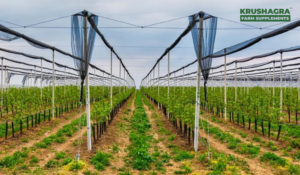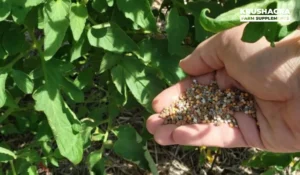This blog explores the diverse landscape of biopesticides, highlighting the crops that benefit from their use and the targeted diseases they effectively combat.
Introduction:
In modern agriculture, the quest for sustainable and eco-friendly pest management solutions has led to the increasing popularity of biopesticides. Unlike conventional chemical pesticides, biopesticides are derived from natural materials such as animals, plants, bacteria, and certain minerals. They offer an environmentally friendly alternative, reducing the reliance on synthetic chemicals while effectively managing pests and diseases. In this blog post, we delve into the world of biopesticides, exploring the crops that benefit from their use and the specific diseases they target.
Understanding Biopesticides
Definition and Types:
Biopesticides encompass a diverse array of biological agents, including microbial pesticides, plant-incorporated protectants, and biochemical pesticides.
Mode of Action:
Biopesticides work on plant diseases by leveraging natural mechanisms to suppress or eliminate pathogens that cause infections. Unlike chemical pesticides, biopesticides often work through multiple modes of action, such as interfering with pest development, disrupting mating patterns, or inducing systemic resistance in plants.
One common type of biopesticide is microbial pesticides, which contain beneficial microorganisms such as bacteria, fungi, or viruses. These microorganisms can either directly attack the pathogens causing plant diseases or stimulate the plant’s own defense mechanisms to enhance resistance. For instance, certain bacteria produce compounds that inhibit the growth of fungal pathogens, while specific fungi parasitize or outcompete disease-causing organisms.
Another type of biopesticide is plant-incorporated protectants, where crops are genetically engineered to produce proteins or other compounds that confer resistance to pests or diseases. These substances may disrupt pest development, interfere with feeding or reproduction, or have toxic effects specifically on the target pathogens. Additionally, biochemical pesticides derived from naturally occurring substances such as plant extracts or insect pheromones can disrupt pest behavior or physiology, effectively controlling plant diseases. Overall, biopesticides offer a targeted and environmentally friendly approach to managing plant diseases, providing growers with effective tools to protect their crops while minimizing ecological impacts.
Crops Benefiting from Biopesticides
- Organic Agriculture:
With the increasing demand for organic produce, biopesticides play a crucial role in organic farming systems. Crops such as:
Organic fruits and vegetables: Including tomatoes, peppers, cucumbers, and leafy greens.
Organic grains: Such as wheat, barley, and oats.
- High-Value Specialty Crops:
Biopesticides are particularly favored in the cultivation of high-value specialty crops due to consumer preferences for residue-free products. Examples include:
Fruits: Apples, grapes, strawberries, and citrus fruits.
Vegetables: Bell peppers, broccoli, and cauliflower.
- Field Crops:
While traditionally dominated by chemical pesticides, field crop production is gradually integrating biopesticides for sustainable pest management. Prominent crops include:
Corn and Soybeans: Biopesticides target pests like corn borers and soybean aphids.
Cotton: Managing pests such as bollworms and whiteflies.
- Horticultural Crops:
Biopesticides are extensively used in horticultural crops due to their sensitivity to chemical residues and the need for integrated pest management (IPM) strategies. Notable crops include:
Ornamentals: Roses, carnations, and orchids.
Nursery crops: Shrubs, saplings, and bedding plants.
Targeted Diseases and Pests
Fungal Diseases:
Biopesticides offer effective control against various fungal pathogens that commonly afflict crops. Examples include:
Powdery Mildew: Targeted in crops like grapes, cucurbits, and tomatoes.
Botrytis Blight: A concern for strawberries, lettuce, and ornamentals.
Bacterial Diseases:
Certain biopesticides contain beneficial bacteria that suppress harmful bacterial pathogens. Examples include:
Bacterial Blight: Managed in crops such as cotton, beans, and peas.
Fire Blight: A threat to pome fruits like apples and pears.
Insect Pests:
Biopesticides provide a sustainable solution for controlling insect pests while minimizing harm to beneficial insects. Common targets include:
Aphids: Controlled in various crops, including citrus fruits, potatoes, and cereals.
Caterpillars: Managed in vegetables, fruits, and field crops.
Nematodes:
Biopesticides containing nematophagous fungi or bacteria are effective against parasitic nematodes in crops such as:
Potatoes, tomatoes, and carrots.
Advantages of Biopesticides
Environmental Safety:
Biopesticides are inherently less toxic to non-target organisms, reducing environmental contamination and preserving biodiversity.
Residue-Free Produce:
With minimal or no chemical residues, biopesticide-treated crops meet consumer demands for healthier and safer food options.
Resistance Management:
Rotating biopesticides with different modes of action helps mitigate the risk of pest resistance development, prolonging their efficacy.
Compatibility with IPM:
Biopesticides synergize well with integrated pest management strategies, promoting a holistic approach to pest control.
Challenges and Future Prospects
Regulatory Hurdles:
The registration process for biopesticides can be arduous and time-consuming, hindering their widespread adoption.
Efficacy Concerns:
Some biopesticides may exhibit variable efficacy under different environmental conditions, necessitating further research and development.
Technological Innovations:
Advances in biotechnology and formulation techniques hold promise for enhancing the effectiveness and stability of biopesticides, driving their future adoption.
Why Choose Krushagra?
- Enhanced Crop Protection:
Krushagra biopesticides are meticulously formulated to target specific crop diseases, offering superior protection against a wide range of pathogens such as fungi, bacteria, and insects. By precisely targeting these threats, Krushagra products help safeguard crop health and maximize yields.
- Environmentally Friendly:
Unlike conventional chemical pesticides, Krushagra biopesticides are derived from natural sources such as plants, microbes, and minerals. They pose minimal risk to the environment, beneficial insects, and non-target organisms, ensuring ecological balance and sustainability in agricultural ecosystems.
- Residue-Free Produce:
With growing consumer demand for residue-free and environmentally sustainable food products, Krushagra biopesticides offer a viable solution. By minimizing chemical residues on crops, they help farmers produce healthier and safer food, meeting the stringent quality standards of modern markets.
- Compatibility with Integrated Pest Management (IPM):
Krushagra biopesticides complement integrated pest management strategies by promoting a holistic approach to pest control. Integrated pest management emphasizes the use of multiple tactics, including biological controls, cultural practices, and monitoring, to manage pests effectively while minimizing reliance on chemical inputs.
- High-Quality Formulations:
Krushagra biopesticides are manufactured using superior quality raw materials adhering to international standards. Rigorous quality control measures ensure consistency, efficacy, and safety, providing farmers with reliable solutions they can trust.
- Expert Agricultural Consultation and Guidance:
In addition to offering premium biopesticides, Krushagra provides valuable agricultural consultation and guidance to farmers and agri-entrepreneurs. Their team of experts offers personalized advice, crop-specific recommendations, and best practices to optimize product efficacy and maximize yields.
Conclusion:
Biopesticides represent a promising avenue for sustainable pest management in agriculture, offering effective solutions while minimizing environmental impact. By targeting specific pests and diseases, they cater to the diverse needs of various crops, from organic vegetables to high-value fruits. As research and innovation continue to expand the biopesticide arsenal, their role in safeguarding crop health and ensuring food security will undoubtedly grow in significance.






